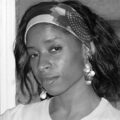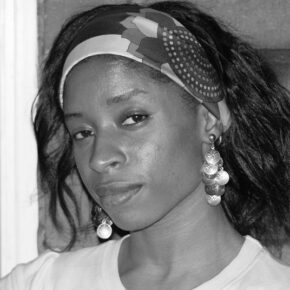Q – Hello Irenosen, thank you for joining us! I wondered if you’d start by telling us how you got started as a writer? Was it something you always wanted to do?
Irenosen Okojie – It’s a pleasure! Well, I always read voraciously as a child. One of my first books was Fantastic Mr Fox by Roald Dahl, and I immediately got the bug – I felt utterly transported.
I carried on reading and then started writing diaries. Those were my first forays into writing!
Q – That’s such a great book – you can’t beat Roald Dahl as a storyteller! How do you keep a coherent structure in your books, and how do you blend character, setting and time into your writing?
IO – I take it chapter by chapter and break it down so it’s small and manageable. With my novel Butterfly Fish, there were three different time periods, and the structure was an issue at first since they felt like separate sections.
How I overcame that was by interspersing the chapters.
I also try to remember my intentions for the characters and the piece, and always refer back to that if I find myself straying.
Q – Do you map out your characters in detail before you start writing, and how do you come up with believable characters?
IO – I do map some characters out. Some are an amalgamation of people I know. The more I write them, the more the sense of who the character really is reveals itself, but you have to trust yourself in the writing space and also do your research.
If you’re writing about a fireman or a doctor, you’d investigate those people and their professions.
When researching Butterfly Fish I looked online, in libraries, visited the British Museum and talked to relevant, knowledgeable people. Once you start digging, things will come and areas to explore will open up.
Q – How do you go about your research?
IO – I’ll give an example: In my novel I was writing about 18th century Benin, which is where my family are from. As well as sourcing books written about the period, I went to Nigeria and researched there. My father also helped by finding books you wouldn’t be able to access in the West.
I looked online, researched any relevant libraries that would have books, visited the British Museum and talked to relevant, knowledgeable people. Once you start digging, things will come and areas to explore will open up.
– Irenosen Okojie
Q – I’ve had an idea floating around for a novel for a while, but this course is the first creative writing I have ever done in earnest. Would you advise getting a little more experience before embarking on a novel, or should I dive right in?
IO – If the idea feels urgent and you can’t stop thinking about it, start it. You gain your experience through the writing, and there will inevitably be several drafts. I’d say crack on. You’ll rise to it – the experience will come as you learn.
Every writer is different, so you have to find what works for you. I tend to have loose plans and fill in the gaps as I go along. For me, that keeps the writing exciting and leaves room for those special moments to appear.
I know that other writers prefer to lay a more concrete plan down before they begin.
Ultimately, you’re feeling your way through the process, and some characters and ideas can start off more fleshed out than others. Try both ways, see how you feel and what you enjoy most.
I love short-form writing and creating miniature worlds, so very often my ideas develop into short stories. It’s a form that allows me to play and experiment.
– Irenosen Okojie
Q – I’m really interested that you write both short stories and novels (much like Roald Dahl!). I’m wondering whether you decide before writing what the format is going to be, or if you start with the story and see where it leads?
IO – Usually I decide the format once I have the idea. I love short-form writing and creating miniature worlds, so very often my ideas develop into short stories. It’s a form that allows me to play and experiment.
Q – To what extent do you consider the marketability of your writing and of yourself? Do you write purely for the love of writing, or do you have a target audience in mind from the beginning? Are there any writers who you think strike a balance of creativity and marketability?
IO – I think Deborah Levy strikes this balance very well. I love her work – she takes risks and it feels like she’s doing it very much on her own terms, even with her recent successes.
I never have an audience in mind when I write. I think that would be slightly crippling for me. Writing for pleasure and just the joy of it means I can be audacious, weird and not worry – but naturally I hope people enjoy what I create.
Telling the story is more important than doing what you think readers might want.
I feel that all writing is investigative at the heart – exploring being human and the strange things people do to cope during difficult periods.
– Irenosen Okojie
Q – I’ve been struggling with a novel, and I keep jumping about rather than writing everything linearly. I’ve got an overall plan, but is writing like this OK, or will it all end up a bit of a jumble?
IO – It’s great that you have an overall plan to reference. That will keep the writing on track, even if your process isn’t linear. I did the same thing with my novel – I wrote the parts which excited me first and worried about the rest later.
The important thing is you keep writing rather than hitting a wall or stopping.
Q – To what extent do you feel you document the world and the experiences around you, or do you prefer to take flight with ideas about how life might be?
IO – it’s a mixture of both. Very often I write about characters on the fringes – often traumatised people on the cusp of change – but the world is fantastical. I blend the surreal with the everyday, and I like the ideas and language that comes from that.
I feel that all writing is investigative at the heart – exploring being human and the strange things people do to cope during difficult periods.
If the intention is clear and the work is strong, once you get an agent they can find the best house for the book.
– Irenosen Okojie
Q – At this point in my career getting published isn’t a priority – and I’m not a fan of writing solely based on what others want to read. However, if my writing were to appeal to readers, I would love it to reach as many people as possible. How would you recommend someone like me approach publishing?
IO – I totally understand – write the stories you want to write – and it’s important that you don’t do something because it’s a trend or commercial.
If the intention is clear and the work is strong, once you get an agent they can find the best house for the book.
Alternatively, independent publishing houses are increasingly taking risks and publishing brave voices. They’re getting the books into shops and winning awards – Galley Beggar Press for example. That may be a route for you.
Q – Thank you so much, Irenosen. It’s been great having you here!
IO – I hope you all feel encouraged. Writing is magical, so please do write the stories you want to tell. Good luck!



